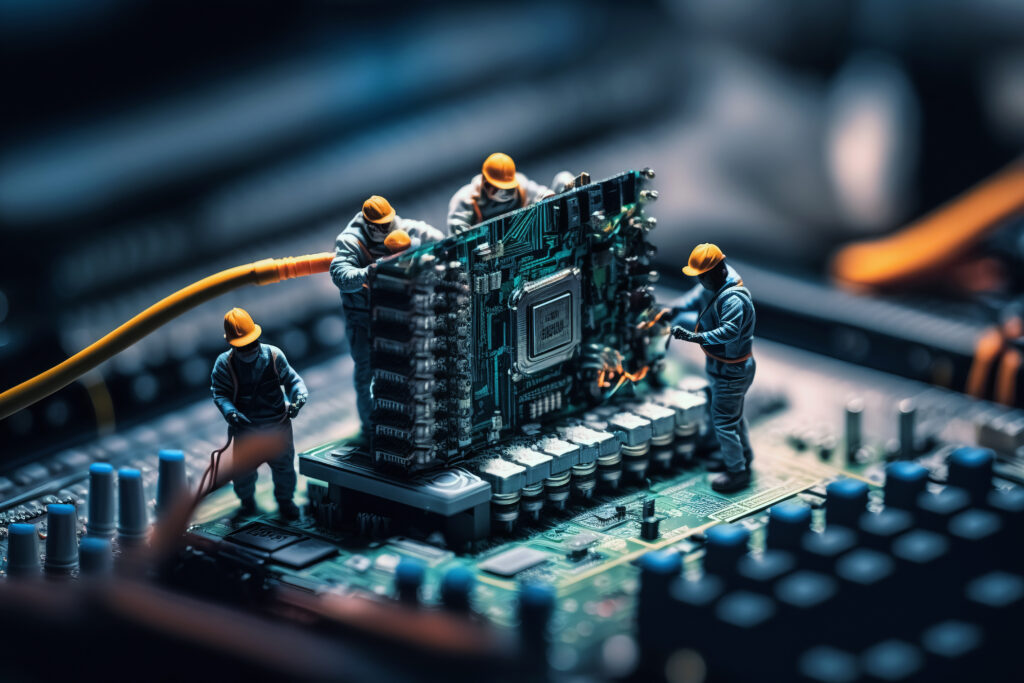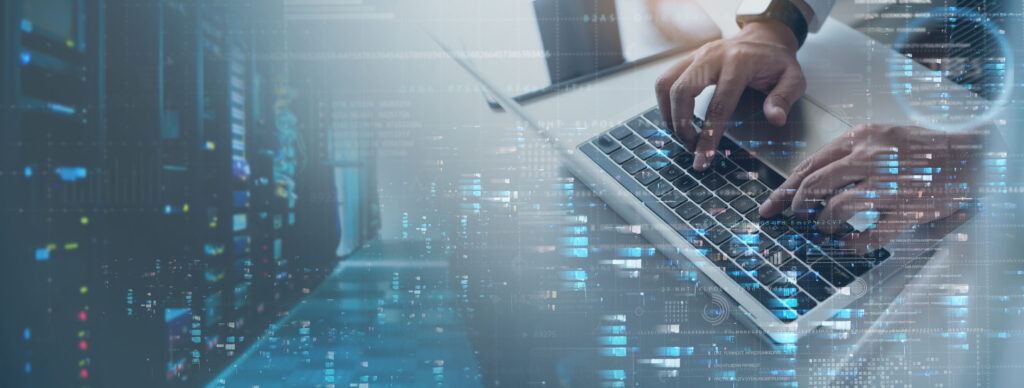In today’s fast-paced digital landscape, the backbone of any successful organization is its IT support system. Once relegated to the background, this sector has surged to the forefront of operational essentials, becoming a pivotal element in ensuring business continuity, security, and efficiency.
The evolution of IT support from a basic helpdesk to a sophisticated network of automated processes and intelligent solutions marks a significant shift in how businesses approach problem-solving and customer service.
With the integration of automation and artificial intelligence (AI), the transformation is about enhancing operational efficiency and redefining the very nature of support services. These technologies promise to streamline routine tasks, predict potential issues before they escalate, and offer unprecedented speed and accuracy solutions.
This transition towards an AI-driven model reflects the changing dynamics of the tech landscape. It underscores a broader shift in the workplace, where technology and human expertise converge to create a more resilient and responsive IT support ecosystem. Let’s learn more.

The Evolution Of IT Support
At first, IT support meant fixing problems as they happened, leading to unavoidable delays. This method was hands-on, with staff directly solving each issue, a process that was not always efficient as technology’s role in businesses grew.
Today, IT support looks much different. It’s about preventing problems before they affect the business and using data to foresee and stop issues. Automation has been crucial to this change, taking over routine tasks like updates and monitoring and allowing IT staff to concentrate on more complex problems.
The early use of AI in IT support marked a major advancement. AI began by improving decision-making, learning from past issues to improve over time. Early AI tools, like chatbots, could handle simple support tasks, providing quick answers to frequent questions. This early use of AI and automation laid the groundwork for a more interconnected system, where technology doesn’t just assist but anticipates IT needs, leading to a smarter, faster, and more user-friendly support system.
The Role Of Automation In IT Support
Automation in IT support means using technology to do tasks without people having to do them. It’s about machines handling routine jobs like sorting support tickets or resetting passwords, which saves a lot of time.
For example, when a new support request comes in, automation tools can determine the problem and who in the team is best suited to fix it. This speeds things up because the right person can work on it immediately. Automating password resets is another way to save time, letting users fix their login problems without waiting for help from the support team.
The main reasons to use automation in IT support include:
- Making things run smoother and faster.
- Cutting down costs by needing fewer people to do basic tasks.
It makes fewer mistakes since machines follow the exact steps every time without getting tired or overlooking something.
The Impact Of Artificial Intelligence On IT Support
AI in IT support involves machines designed to analyze, learn, and make decisions, enhancing how support services are delivered. AI’s relevance in IT support comes from its ability to handle complex tasks more efficiently than traditional methods, improving both the speed and quality of support services.
Current applications of AI in IT support include chatbots that interact with users to solve common problems or direct them to the right resources without human intervention. Predictive analytics is another AI tool that analyzes data to predict potential system failures or security breaches before they happen, allowing preemptive action to avoid downtime or data loss.
The advantages of AI in IT support are significant. AI systems can operate 24/7, offering immediate assistance anytime—a major improvement over traditional support that may be limited by office hours. AI also learns from every interaction, constantly improving its responses and solutions. This ability to learn and adapt can lead to more personalized and effective support over time, surpassing traditional methods that might not evolve as quickly or be available around the clock.
Emerging Technologies Shaping The Future Of IT Support
Emerging technologies like machine learning and natural language processing are setting the stage for the next leap in IT support. Machine learning enhances systems’ ability to learn from data, improving their responses and solutions. Natural language processing allows computers to understand human language, making user interactions and AI more seamless and effective.
Future applications of these technologies in IT support include advanced diagnostics, where systems can identify and fix issues without human intervention, and personalized support, offering solutions tailored to individual user needs and preferences. These advancements could significantly reduce resolution times and improve user satisfaction.
However, adopting these technologies comes with challenges. Ethical considerations, such as data privacy and the transparency of AI decisions, are critical. There’s also concern about job displacement, as automation and AI might take over tasks currently performed by humans. Balancing technological advancements with these considerations will be crucial in shaping a future where IT support becomes more efficient and remains ethical and inclusive.
The Human Element In The Future Of IT Support
Despite the rise of automation and AI, the human element remains crucial in IT support. Human oversight ensures that AI systems work as intended and ethical standards are maintained. Intuition and experience often play key roles in solving complex or unusual problems where AI might fall short.
Blending AI with human expertise leads to the best outcomes. AI can handle routine tasks and analyze data quickly, while humans bring understanding, creativity, and empathy to more complex issues. This partnership allows for efficient problem-solving and ensures that technology serves users effectively.
As the IT support landscape evolves, training and skill development for professionals become essential. It is crucial to learn to work alongside AI, understand its capabilities and limitations, and develop skills in areas where humans excel over machines, such as strategic thinking and interpersonal communication. This focus on continuous learning will enable IT support professionals to remain valuable in an AI-driven era, ensuring they can oversee AI systems, add human insight to automated processes, and provide the empathy and understanding that only a human can offer.

Challenges And Limitations
The future of IT support, while promising, faces challenges and limitations that need to be addressed. Current AI and automation technologies, though advanced, are not perfect. They can struggle with tasks that require deep understanding or creativity, and their solutions may not always be as nuanced or context-aware as those provided by humans.
Data privacy and security are significant concerns. As IT support systems collect and analyze more user data to improve efficiency and personalization, the risk of data breaches or misuse increases. Ensuring that these systems are secure and handle data ethically is crucial to maintaining trust and compliance with regulations.
Resistance to change within organizations is another hurdle. Transitioning to new IT support models can be daunting for employees accustomed to traditional methods. Concerns about job displacement, needing new skills, and adapting to new workflows can lead to resistance. Addressing these concerns through clear communication, training programs, and demonstrating the value of new technologies can help ease the transition and foster a culture of innovation and adaptability.
Looking Ahead: Predictions And Trends
Looking into the future, experts predict that IT support will continue to evolve, becoming more integrated with AI and automation technologies. This integration will likely lead to IT support systems that are more efficient, predictive, and personalized, capable of anticipating issues and addressing them before they impact users.
Continuous innovation and adaptation will be key. As technology advances, IT support systems must evolve to leverage new capabilities and meet changing user expectations. IT support professionals must stay on the cutting edge of technology trends, ensuring that their skills and knowledge are up-to-date.
Over the next decade, IT support may transform in several ways. Systems could become more autonomous, capable of self-diagnosis and repair without human intervention. Support may also become more personalized, with AI understanding individual user preferences and history to provide tailored assistance. Additionally, virtual and augmented reality could offer more immersive support experiences, allowing technicians to guide users through solutions in a more interactive manner.
These advancements will redefine the landscape of IT support, making it more proactive, user-centric, and efficient. However, achieving this future will require overcoming current challenges, including ensuring data privacy, managing the human impact of automation, and fostering a culture of continuous learning and innovation.
Conclusion
Integrating automation and AI can significantly transform IT support, making processes more efficient and support more responsive and personalized. These technologies are set to streamline routine tasks, predict issues before they escalate, and offer solutions in real time, thereby enhancing the overall user experience. As we look towards the future, the role of IT support teams is poised to evolve, shifting from reactive problem-solving to proactive and strategic operations that leverage technological advancements to deliver superior service.
Despite the rapid advancements in technology, the human element remains indispensable. Balancing technological capabilities with human insight is crucial, as complex problem-solving, empathy, and ethical considerations require a human touch. Encouraging a proactive approach towards adopting and adapting to new technologies will be key for organizations and IT professionals. Staying informed, continuously learning, and being open to change will ensure that the future of IT support is both innovative and inclusive, effectively blending the best of technology with the invaluable strengths of human expertise.










Leave a Reply